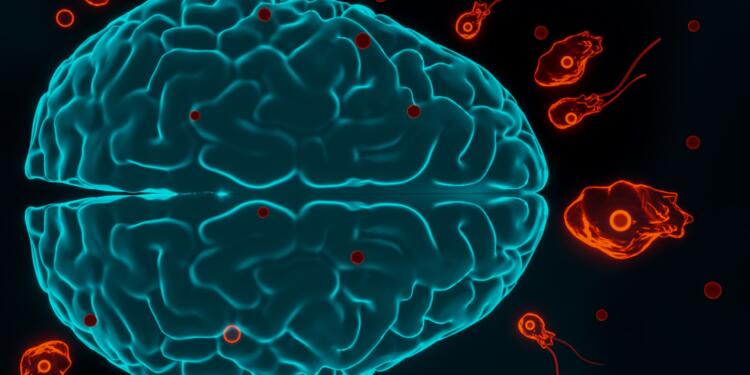In recent months, Kerala has faced a concerning increase in cases associated with Naegleria fowleri, commonly known as the brain-eating amoeba. This microscopic organism, typically found in warm freshwater environments and soil, poses a significant health risk to individuals engaging in activities such as swimming in contaminated water sources.
Naegleria fowleri enters the human body through the nasal passages, particularly when water containing the amoeba is forcibly introduced into the nasal cavity. This can occur during activities such as diving, water skiing, or even when using contaminated tap water for nasal irrigation. Once inside, the amoeba travels along the olfactory nerve fibers to reach the brain, where it causes severe inflammation and destruction of brain tissue.
How Does the Brain-Eating Amoeba Infect Individuals?
The entry of Naegleria fowleri through the nasal passages leads to an infection known as primary amoebic meningoencephalitis (PAM). Contrary to some misconceptions, infection does not occur through ingestion of contaminated water; it is solely through nasal exposure. This makes activities like swimming in warm freshwater bodies, especially those with poor circulation or inadequate chlorination, particularly risky.
Symptoms of Primary Amoebic Meningoencephalitis
Recognizing the symptoms of PAM is crucial for early intervention. Initially, infected individuals may experience symptoms akin to a common cold or mild flu, including headaches, fever, nausea, and vomiting. As the infection progresses, more severe symptoms such as a stiff neck, confusion, seizures, hallucinations, and eventually coma may develop. According to data from the US Centers for Disease Control and Prevention (CDC), the prognosis for PAM is grim, with most patients succumbing to the infection within a matter of days after symptoms first appear.
Incidence and Impacts in Kerala
Since May, Kerala has witnessed several tragic cases of primary amoebic meningoencephalitis. Among them, a five-year-old girl from Munniyoor in Malappuram and a 12-year-old boy from Ramanattukara, Malappuram, stand out. The girl tragically lost her life after bathing in the Munniyoor river, while the boy remains in critical condition at Baby Memorial Hospital. These incidents underscore the critical need for heightened awareness and preventive measures to curb further infections.
Treatment Challenges
Managing primary amoebic meningoencephalitis remains exceptionally challenging due to the lack of a universally effective treatment protocol. Current therapeutic approaches involve a combination of drugs, including amphotericin B, azithromycin, fluconazole, rifampin, miltefosine, and dexamethasone. However, the efficacy of these treatments varies, and survival rates remain low once the infection progresses to advanced stages.
Preventive Measures
Preventing primary amoebic meningoencephalitis primarily revolves around public education and adherence to preventive measures. Avoiding activities in warm freshwater bodies, especially during periods of high water temperatures, can significantly reduce the risk of exposure. Additional precautions include using nose clips or holding the nose shut when engaging in water-related activities and ensuring that swimming pools and other recreational water venues are adequately maintained and chlorinated.
Conclusion
The recent surge in cases of primary amoebic meningoencephalitis in Kerala serves as a stark reminder of the lethal potential of Naegleria fowleri. Heightened vigilance, swift medical intervention upon symptom onset, and robust public awareness campaigns are critical in combating this rare yet devastating infection. By understanding the modes of transmission, recognizing early symptoms, and advocating for preventive measures, communities can work together to minimize the risk posed by this deadly pathogen. Efforts in research and public health initiatives are essential to improving treatment outcomes and ultimately preventing future tragedies caused by the brain-eating amoeba.
ALSO READ: Chandrababu Naidu had a meeting with Modi for ………..?

























